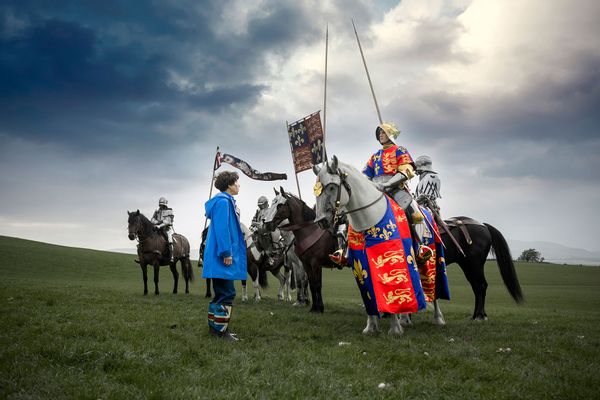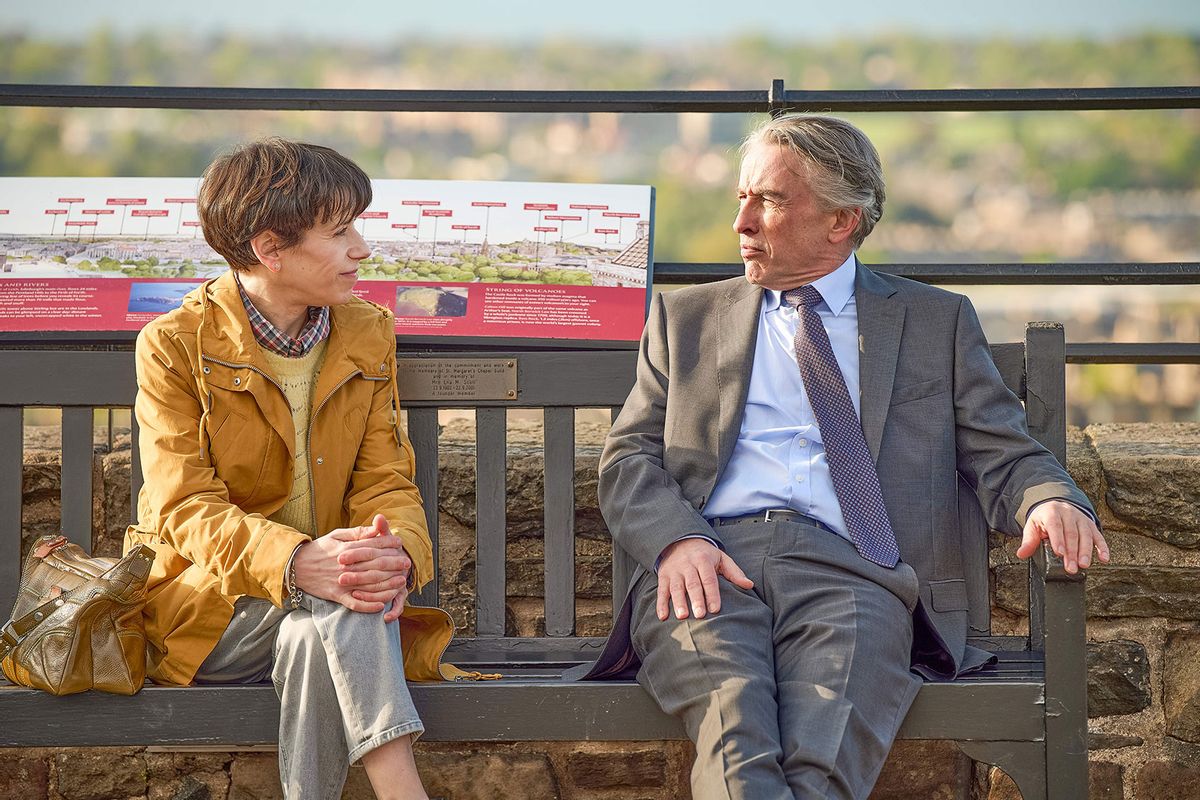Steve Coogan is very serious regarding certain subjects. These days that's not much of a stretch, even taking into account his filmography's heavy comedic skew. In the U.K. he's mainly known as blowhard broadcaster Alan Partridge, a character he co-created with Armando Iannucci ("Veep") who, in a very real way, has taken on a life of his own. Stateside, Coogan's respected as a versatile comedic actor who appears in large franchises and cult favorites like "Tropic Thunder" and "Hamlet 2."
When the real Philippa Langley pinpointed Richard III's remains, her efforts were quickly dismissed by the academic establishment at Leicester University.
But his part in making "The Lost King," which he co-wrote with frequent collaborator Jeff Pope and in which Coogan stars, reflects his dedication to telling stories of people who might have otherwise gone unnoticed. Coogan's latest links the 2012 discovery of the remains of the last Plantagenet King Richard III, unearthed from beneath a parking lot in Leicester, with the existential journey of the woman who sought him out in the first place Philippa Langley (Oscar nominee Sally Hawkins).
The movie's Philippa feels a kinship with Richard III, whose remains were long presumed to be scattered and irretrievable. Philippa's passionate doubt pushes her to abandon a career where her bosses have sidelined her, citing her chronic fatigue syndrome as an excuse to deny her promotions. It turns out that tracking a mystery that other historians assumed to be unsolvable is a better fit for her drive.
When the real Philippa Langley pinpointed Richard III's remains, her efforts were quickly dismissed by the academic establishment at Leicester University. The institution took credit for the discovery in 2013 without formally acknowledging her contributions.
That brought Langley to the attention of Coogan, Pope, and director Stephen Frears, who worked together on the Oscar-nominated 2013 film "Philomena," another thoughtful examination of a woman searching for someone long lost to her.
 Sally Hawkins as "Philippa Langley" and Harry Lloyd as "Richard III" in Stephen Frears' "The Lost King" (Courtesy of IFC Films)
Sally Hawkins as "Philippa Langley" and Harry Lloyd as "Richard III" in Stephen Frears' "The Lost King" (Courtesy of IFC Films)
Coogan, who plays Philippa's ex-husband John in the movie, found Philippa's relationship with Richard III especially fascinating. In the script, he and Pope choose to have the lost king haunt Philippa (in the form of Harry Lloyd, familiar as Viserys in "Game of Thrones").
"She saw a sort of a kinship with the fact that he had been rendered in a certain way, and she felt like that about her life," Coogan explained in a recent interview conducted over Zoom. "And I think she sort of used Richard as this sort of avatar for herself, to find herself."
Richard III is also an uncommon inspiration since in most history books and one of William Shakespeare's best known works, he's viewed as a heartless, scheming villain. We discussed this with Coogan and other threads that inspired "The Lost King" as part of a conversation transcribed below that's been lightly edited for length and clarity.
Melanie McFarland: What drew you to Philippa's story?
Steve Coogan: Well, I think it was not so much the looking for Richard III, the missing body of a dead king, as her personal story. When I met her, she told me what happened to her. She seems to have done it more or less on her own, which wasn't how the story was presented in the news when the body was discovered. But I felt that her story had been subsumed had been rubbed out, she'd been made invisible by the official version. I wanted to address that, because I felt that it was a great injustice. […] She went on this journey, was vindicated by being successful, and then had defeat snatched from the jaws of victory the same way that Richard III's history was rewritten by Shakespeare. The history of who had discovered [his remains] was rewritten by Leicester University.
"More interesting than the historical aspects of it is a woman's struggle — a middle-aged, invisible, overlooked, underestimated woman — who was undeterred."
Richard III is recognizable as being this great villain to play, but people also enjoy the malleability of what that means. Philippa is drawn to this idea of redressing the way he was wronged in historic accounts. Is it unusual to you that there's an appeal in looking at this character in a different way than the typical villainy that's assigned to him by Shakespeare?
Well, there is an appeal in seeing how the victors write the history. And that has always been the case. That's what we see in propaganda.
So in that respect it's interesting to use Richard III to sort of examine that. Whatever the truth is, we only get an edited version. There's lots of political reasons why it was in the interest of the Tudors to demonize the king who they had usurped. It's what victors do […] they have to destroy the people and their reputation to ensure their longevity.
[...] More interesting than the historical aspects of it is a woman's struggle — a middle-aged, invisible, overlooked, underestimated woman — who, despite the odds and the patriarchy who mobilized themselves against her when she finally found the body, that she was undeterred.
The university's version of events had been swallowed and accepted hook line and sinker by the establishment. And when I heard her story, I was incensed, because she didn't have any letters after her name or papers published, that her version of events was deemed not really credit-worthy. I was determined to attempt with Jeff and Steven to right that, and, as it were, give the final piece of her jigsaw puzzle.
 Harry Lloyd as "Richard III" in Stephen Frears' "The Lost King" (Courtesy of IFC Films)
Harry Lloyd as "Richard III" in Stephen Frears' "The Lost King" (Courtesy of IFC Films)
How much did your work on "Philomena" and the process of writing that script inform both the interest in and the way that you may have shaped Philippa's story?
Well, we're telling it from her point of view, we're not apologizing for that. The university have had their version of events. And now it's Philippa's turn. It is that simple. And not having a huge PR machine to deploy, we sort of make up for that by putting her version out in the form of a movie.
Jeff and I were struck by the fact that [Philippa] was very friendly and close with her ex-husband. We thought we hadn't seen that ... on screen a lot.
So in terms of Jeff and I, the way we go about it, we sort of did the same approach. Jeff used to be a journalist full time before he started screenwriting years ago. And Jeff does his own projects: Jeff did the "Stan and Ollie" movie that he wrote and I was in, but I didn't write with him. You know, we've collaborated a lot over the years. I just played a famous sex offender called Jimmy Savile for BBC, which Jeff produced. That is going out this fall. And when we did "Philomena," we traveled to Ireland. We talked to some of the nuns, we talked to Philomena [Lee, played by Judi Dench in the film], we talked to people who knew her.
[…]So we did a bit of research. And we sort of did the same thing with this. It's not a journalistic piece. It's a point of view. But then so was Philomena's story, it was her experience.
But I think we're quite Jeff and I are quite ethical. We're our own harshest critics when it comes to what we consider acceptable and what isn't. We don't have people do malicious things if they didn't do it, or people behave in certain ways that they didn't. We don't invent negativity, unless it's there. We might change the way it's manifests if someone, for example, says something rather unsympathetic in a letter, we might have a character say it instead.
So let's talk a little bit about your portrayal of John. Many times when there's a situation like this, where there's strain in a marriage, there can be a compulsion on the part of the writer or actor to make someone either better than they are in real life, or worse, just in terms of taking dramatic license. You didn't do that here.
Jeff and I were struck by the fact that [Philippa] was very friendly and close with her ex-husband. And we thought we hadn't seen that very often, if at all, kind of a friendly, supportive relationship that was no longer a marriage. I mean, obviously, it exists, but hadn't seen it on screen a lot.
Often good drama comes from conflict, but how do you find it in kindness?
I went for a long walk with John, who I played, and we had dinner, and we were sort of led by him. It's very close to his story, his journey of being skeptical thinking that she that Philippa was obsessive to the point of believing she was having some sort of breakdown. And he realized she was just pursuing something she wanted to, and he ought to be supportive.
[…]That's a great story to see that kindness and it also was an interesting role, I think, for supporting male character to be. I remember watching the David Lynch's "Straight Story," which is a favorite of mine. And what I loved about that movie is that there are no villains in it. Most of the characters are basically nice people, good people. And you know, we see, the world as more like that than full of horrible people. It's just that those people aren't often rendered on screen.
I've always remembered that when I watched that film, thinking, "Oh, good people can be interesting. Kind people people can be interesting." And so it was nice for me to do that and nice for me to play that. I normally play a***holes. So it was nice for me to play someone who's not.
Yeah, you can you can tell that there was a lot of caretaking with that character.
Thank you.
You began this project in 2014, is that correct?
That sounds right. Well, I had a lunch then, I guess. If you think the first lunch I had with Philippa was then, then yes.
The main reason I ask that is that right now in the United States, there's been a push toward erasing history, rewriting it, the same kinds of things implied in what Philippa is saying when she points out that the victors were invested in writing Richard the III in the worst way possible. Did you ever think that the underlying message of Philippa's story — as in, "we're going to tell the truth about this person" and "I just don't like bullies winning "— would ever relate more broadly to issues like what we're dealing with today?
I think we did. I mean, there is a quote that someone said to me, that "there are never any war criminals on the winning side." And that always resonated with me.
[...] The thing is, you need different perspectives on history. There are two histories in this. There's the history of Richard III and who he was. And there's Philippa's discovery of Richard III and what version of that is correct. And we felt that we were just redressing the imbalance in having only one version of events, which is the university's. We provide a counterpoint and one that I would say is the more reliable version out there.
 Sally Hawkins as "Philippa Langley" in Stephen Frears' "The Lost King" (Courtesy of IFC Films)
Sally Hawkins as "Philippa Langley" in Stephen Frears' "The Lost King" (Courtesy of IFC Films)
Erasing people from history is always bad. Re-evaluating them is always useful. Perhaps people who we hero worship are not quite as — you know, in every saint, there is a speck of dust and every sinner a spark of gold. People are complicated, aren't they? No one's purely heroic. There's almost no one like that in history. But people don't like that. They like the stories that either demonize or lionize these people. Discussion and different points of view are healthy but trying to peddle one single, unchallenged version of anything is not healthy.
I hope you'll indulge me, because I'm going to ask you about one of my favorite films. If people don't know you from "Philomena," or your other comedic roles, they may recognize you as the guy who starred in "Hamlet 2."
It's so funny that you say that, because no one's heard of that movie in this country. No one! And it kind of came and went when it came out. But it's developed a kind of a cult following which I'm very delighted about, you know. It's one of those movie phenomena that has a life after the event, and I'm pleased. I mean, Emma Stone did a TV show when she said whenever she's a bit depressed, she watches "Hamlet 2."
Yeah. And these are very different movies, obviously. But I wonder you think is the allure of writing or acting around the legend of Shakespeare versus performing his work. Do you find it more rewarding to play with Shakespeare's legend?
I can't rewrite his stuff because he did it pretty well the first time! No, I mean, I went to drama school and I studied English literature and read Shakespeare and learned about him. He is our greatest writer, I still think he is. I've always thought that however wise people feel that the Bible is that Shakespeare, probably trumps it, in terms of wisdom.
That's funny that you thought of "Hamlet 2" as another Shakespeare thing.
No, no. Obviously it's not. But it is a ridiculous extension of his legend.
It's always fun to play with these things, isn't it? […] Although, I didn't write that. Pam Brady, who is wonderful, did, with a lot of input from Andy Fleming, who is a wonderful director. So I just like to do stuff that's a bit different and vary what I do. I'm very grateful that I'm able to do different things. And I always collaborate with different people and do these funny silly things that that are light and then do things that have got more meat on the bone.
I'm very privileged that I can move around. It means that you don't sort of have singular success in one area. I mean, in the U.K. I'm known primarily as Alan Partridge and not much else, frankly. In America I'm less well known but they think I'm more of a multi-hyphenate, for those who do know me. What I find is that all the all the performers, writers, the creatives in the U.S., already like me and respect me and everything. It's just that no one the street knows who I am.
Well, that can be a benefit as well, right?
Oh, sure. I don't get recognized in Walmart, but I do get recognized in Whole Foods. So that sort of gives you a measure of what my demographic is.
"The Lost King" is now playing in theaters.
Read more
about this topic



Shares